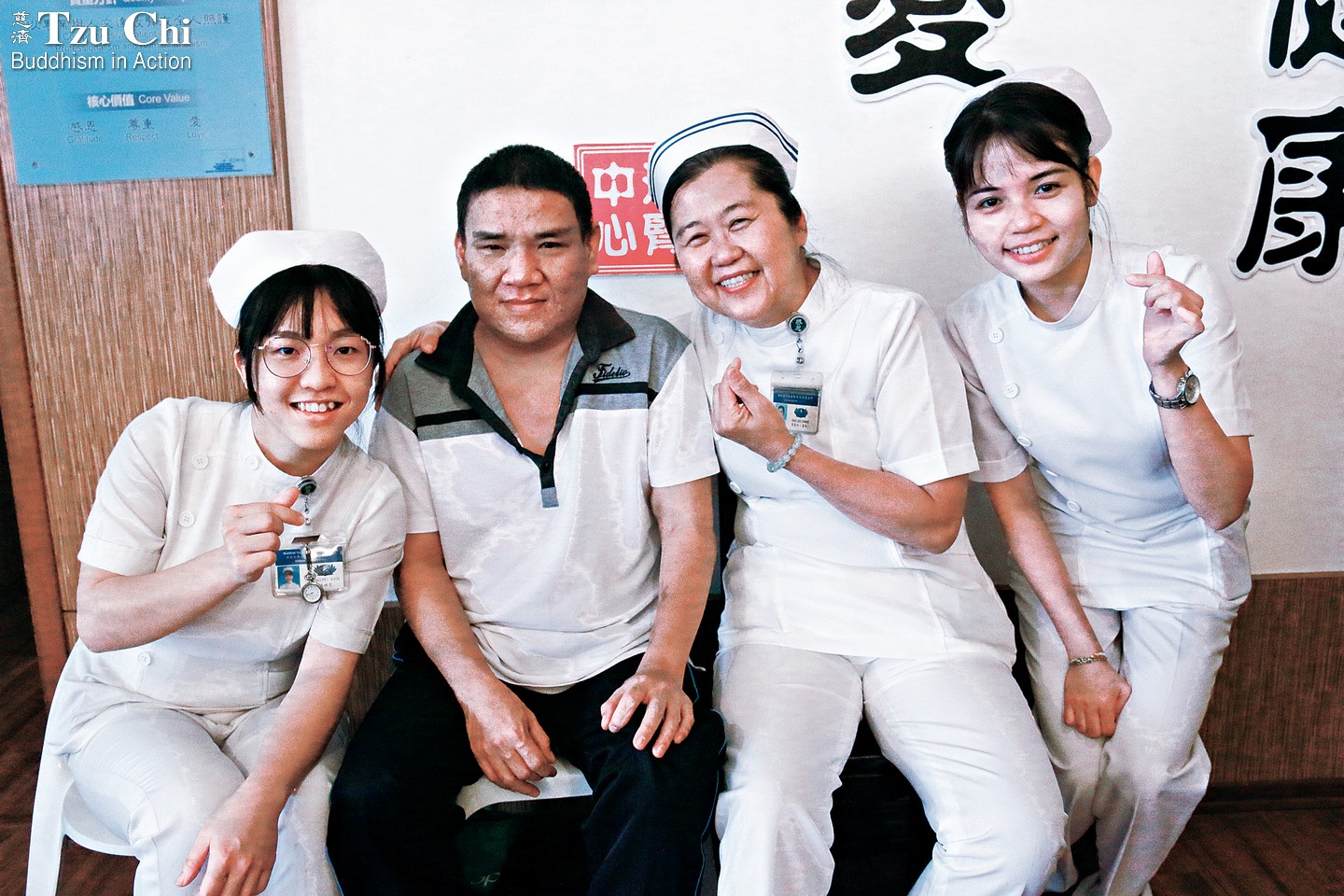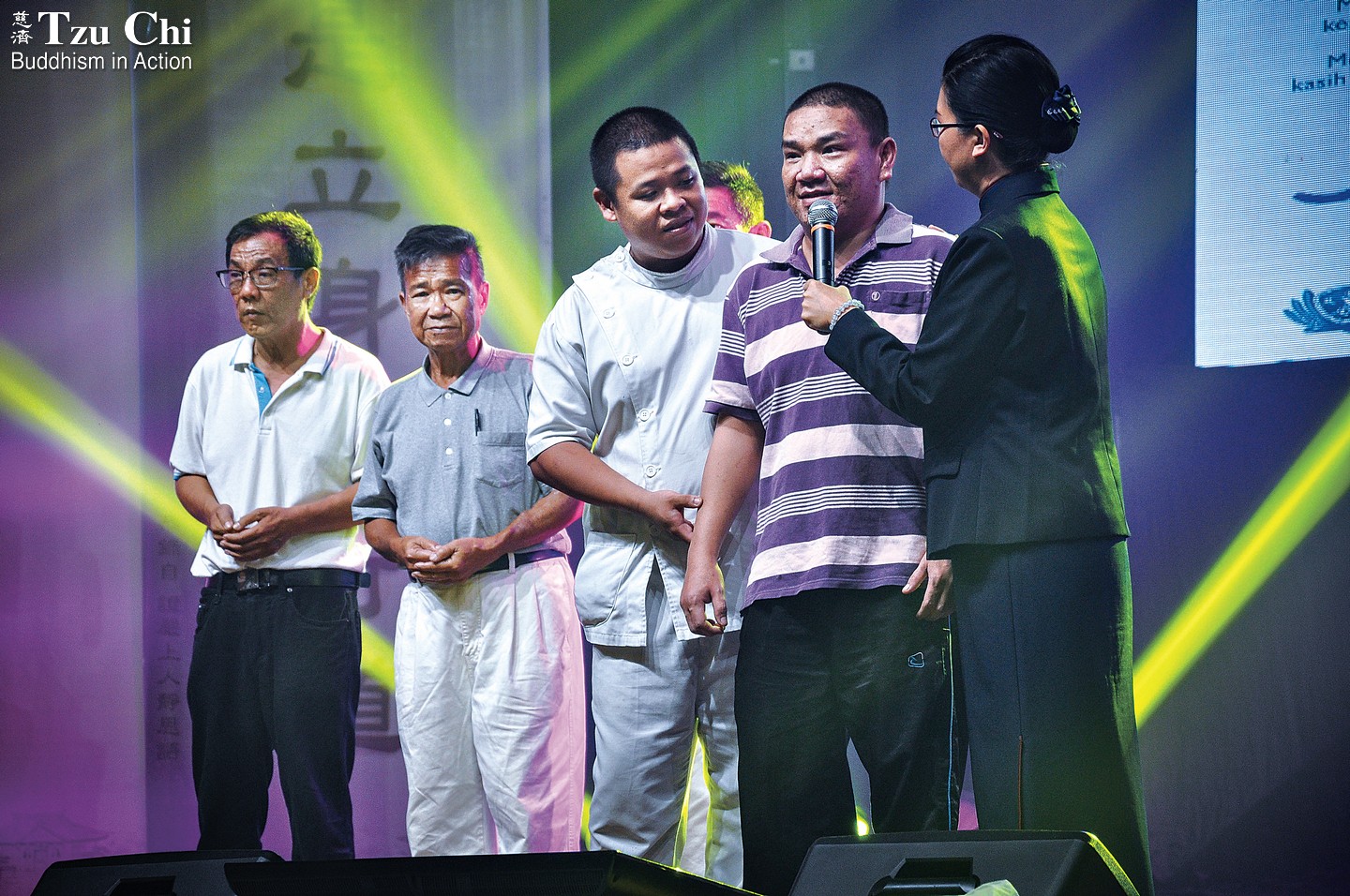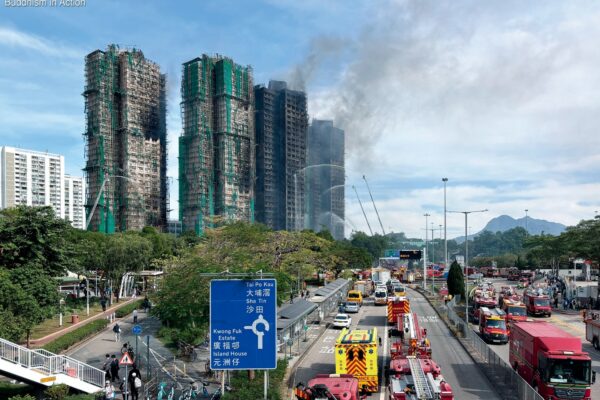Narrated by Hann Ping A/L Ba
Compiled by Tan Chia Hoong
Translated by Wu Hsiao-ting
Photo by Yew Chin Bey
People who donate to the Tzu Chi Dialysis Center in Kedah, Malaysia, are willing to support us in extending our lives, even though we have never met. In gratitude for such kindness, I should naturally cherish my life.

Hann Ping and nurses at the Tzu Chi Dialysis Center in Kedah, Malaysia, express gratitude to each other during the center’s annual gathering in 2020.
My name is Hann Ping. I was an ordinary boy in my childhood and teenage years—optimistic, cheerful, and talkative. I never held any grand aspirations. All I ever hoped for was to grow up, secure a stable job, provide for my parents, and, if possible, start a family of my own.
However, as the older generation often says, “Heaven has its own plans.” Things don’t always unfold as we envision. Many aspects of life, including our health, lie beyond our control.
As I neared my 30th year, my previously healthy body started experiencing unexpected issues. It felt like an abrupt, uncontrollable turn in the road, with no brakes to stop the downward spiral. My left leg, eyes, and kidneys were all severely affected.
Diabetes triggered a bacterial infection in my lower left leg, leading to multiple surgeries. Finally, the doctor recommended the damaged limb be amputated and replaced with a prosthesis. I chose to follow this recommendation, believing I could still lead an independent life after the amputation.
But my problem wasn’t limited to my leg. Over the subsequent months, my vision gradually faded until I found myself in total darkness. Just as I had with my amputation, I accepted my blindness with equanimity, trusting in a higher power’s arrangement. I told myself I just needed some time to acclimate to my new pitch-black reality, and then I’d be fine.
Later on, my urine output dwindled, my body swelled, and my appetite waned. After several medical consultations, the doctor declared that dialysis was essential to save my life. My mother had endured the rigors of dialysis during her later years, and it was a taxing experience. Contemplating a similar journey filled me with dread.
Dialysis differs significantly from fitting a prosthesis or adapting to blindness. It’s not as simple as merely getting accustomed to it. Undergoing dialysis meant committing four hours to the machine three times a week. It seemed unlikely that I’d be able to maintain a stable job under these circumstances. Another daunting question loomed: how would I manage the substantial medical expenses that were bound to come? I could only imagine inevitably becoming reliant on my two sisters, forfeiting my independence. That was the last thing I wanted.
Before the boat sank
I came from a family that was far from well-off. I dropped out of school at ten and took on odd jobs to help support our household. I left my hometown as a teenager, in search of a means to make a living. Wandering without a fixed residence, I was like a boat adrift, yearning for stability in the voyage of my life. I clung to the belief that I would one day find a safe harbor. Even in the face of occasional storms over the years, I gritted my teeth and persevered.
But facing dialysis was like battling unbeatable waves. I felt completely powerless. I simply wished to sink to the bottom of the sea. My foremost concern was not to become a burden to my family.
I couldn’t bear to face all this, so I chose instead to slowly fade away. I deliberately ate high-sodium foods and increased my daily water intake to induce swelling in my body. There was even a time when I developed fluid in my lungs. These self-imposed choices landed me in the hospital time and again.
This cycle persisted until my sisters discovered the Tzu Chi Dialysis Center in Kedah. The center offered free dialysis services. Since my family couldn’t afford regular dialysis, this was supposed to be great news for us. But it did little to lift my spirits. I wondered when I would be able to fulfill my wish of departing from this world once I commenced treatment there. However, I am the youngest in my family, with my two sisters being over a decade older than me. My mother entrusted them with taking good care of me before she passed away. To ease my sisters’ worries, I reluctantly consented to become a patient at the dialysis center.
To my surprise, once I started treatment there, I found myself genuinely grateful to the center. Back at home, my sisters had provided me with meticulous care, but their concerns about my emotional well-being, given my visual impairment and other physical conditions, had led them to steer clear of certain subjects in my presence. I understand their intent to protect my feelings, but this approach only deepened my sense of inadequacy. But the dialysis center is different. The nurses at the center engage in friendly conversations with me about all kinds of topics, including food, current events, and travel. I also have heartfelt conversations with fellow patients and share light-hearted moments with them. I appreciate the way I am treated there, and that’s why it is only at the dialysis center that I really feel like a normal person.
I undergo three dialysis sessions each week at the center. Every time I step inside, the nurses there greet me warmly and inquire about my well-being. We don’t even show such warmth and concern to our own family members at home. How can I not be touched by their warm treatment?
After I began treatment at the center, my outlook underwent a transformation, and I no longer yearned for death. Instead, my thoughts now often turn to the generous donors who support this dialysis center. They are complete strangers to us, yet they extend a helping hand like a ray of sunshine during our darkest moments. I resolved to cherish my life, not wanting to disappoint those kind-hearted donors. I also decided that if the dialysis center ever needed my assistance, I would eagerly help.

Hann Ping (second from right) extends his appreciation at a thanksgiving event to people who have donated to the Tzu Chi Dialysis Center in Kedah, emphasizing that their generosity allows kidney patients like him to see hope.
Ying Jian Hua
Life’s ups and downs
My eyes may be impaired, but my mouth and voice are perfectly fine. There are still ways for me to make a meaningful impact on others, such as offering emotional support. Whenever a fellow kidney patient feels down or has just started dialysis, the nurses deliberately seat me beside them during the four-hour treatment session. In those four hours, I seek out opportunities to chat with them, share my experiences, and help them view their situation from a different perspective, so they don’t get too discouraged. When I succeed in opening their hearts and making them smile instead of frown, I feel so happy and fulfilled. I feel I’ve performed a good deed. Not even money can buy that kind of happiness.
Sometimes, I am invited to participate in Tzu Chi events to inspire fellow kidney patients or people with disabilities. I am grateful for such opportunities to help. I want donors to see that every cent they contribute has the power to transform lives, including mine. Furthermore, it’s a way to emphasize the message that if I can lead a meaningful life in the face of my many challenges, others can lead equally meaningful lives in the face of theirs.
Losing my left leg wasn’t too bad because I have a prosthetic that allows me to walk. The loss of my eyesight, while undeniably inconvenient, had its silver lining—it made my world significantly more beautiful. Without the ability to perceive physical appearances, I naturally harbor no biases or preconceived notions. For instance, when encountering a stranger, I’m oblivious to their external features. My sole focus is on their words. Through our conversation, I come to discern their personality and character, their joys and sorrows. Their physical appearance never influences my judgment, making it easier for me to discern their inner beauty and goodness.
In the past, I neglected my diet and hygiene, leading to recurrent hospitalizations. But that chapter of my life is behind me. I am now a conscientious kidney patient. I carefully manage my water intake and watch my diet. Despite my best efforts, my health remains somewhat unpredictable. But, as they say, life is filled with more ups and downs than smooth sailing. Finding contentment in the midst of our trials is the key.
Occasionally, I have thoughts of despair. After all, I’m not used to relying on my family. If, one day, my health takes a serious turn, I hope my family will allow me to go in peace and then scatter my ashes at sea so my soul can explore this beautiful world. This, you could say, is my final wish.
For now, my health is holding up reasonably well. I am deeply grateful for the care and support I receive from everyone. I will continue to give my best, treasuring each day until that inevitable last day arrives.



